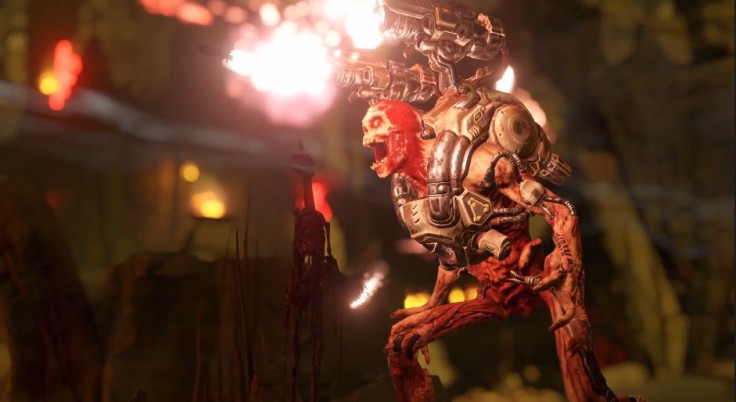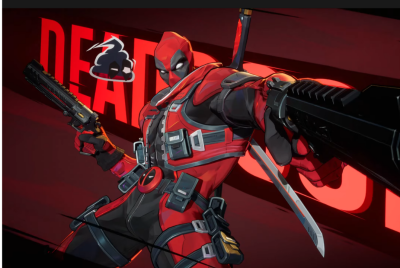Doom 4 should avoid latent psychoanalysis and embrace mindless blockbuster action

I want id Software's new Doom to wash away a current trend whereby games have become obsessed with psychology. I don't need to know why Lara Croft is shooting guns and raiding tombs – I just want to enjoy her doing it. I don't care about Nathan Drake's history, or his brother, or what's really going on behind his eyes – I want to indulge in a few hours of action and jokes.
Recently, games that contain characters who have psychological malaise at their root have been conflated with games that are "well-written". Games celebrated for their narrative, such as Telltale's The Walking Dead, The Last of Us, and Far Cry 3 all contain characters who cry, complain, and introspect.
Although it's healthy to cast a critical eye over video game scripts and expect more humanity from the humans we play on-screen, psychological brooding simply because it's professedly more serious does not necessary equate to better writing.
On the contrary, a great adventure story, in the vein of Indiana Jones, Jaws, or even those earlier Uncharted games, is an incredibly difficult thing to create, and I respect those writers who are able to walk the line between plausible characters and blockbuster excitement.
That's a more difficult thing to do than what a lot of games (and TV and movies) seem to prefer of late, which is to plunge face-first into misery in the name of credible fiction.
It's so cynical. After years of pop-culture referencing itself, in the Marvel movies, in Family Guy, in games like Tomb Raider (where Lara, in a woeful display of post-modern awareness, exclaims "I hate tombs!"), audiences have become sensitised to showmanship and the machinations of fiction. A kind of smugness has descended.
Going along for the ride, in the spirit of the great adventure movie, feels too much now like letting ourselves be fooled. It's why in the Ant-Man trailer, Ant-Man has to make a joke about his name being Ant-Man - "I didn't pick it."
Audiences, and games and movies, seem to have lost their tolerance for magic. Everything has to be knowing and self-aware, with a wink to the internet forum. Look at Cabin in the Woods. Look at Sunset Overdrive.
And that's why psychology reigns, because the only thing we'll fall for now is what seems "real" - misery, suffering, violence and bleakness. The joke of course is that the stories "sold to us" by the great, un-cynical games and movies were no less real. Excitement, fun, happiness and awe are just as real emotions as the sheer despair peddled now by pop-culture, but because they came first, and they're what we've deconstructed and poked fun at, they nowadays ring false.
For the love of God I don't want a world comprised of action games. Call of Duty, Halo and the rest of that canon are bland to the point that they're even more cynical than psychology-obsessed "gritty" games, since they assume audiences will go for just about anything so long as the franchise name is printed on the box.
But I like a roller coaster. I like guilt-free excitement. And I like spending time with characters who are easy to spend time with, not just ones that I feel sorry for.

So Doom, due to be shown off at next month's E3, is carrying a lot of my hopes. For me, it's the original roller coaster, one of the earliest and best examples of a game balancing action, excitement, and even a bit of substance.
I'm hoping that developers id Software - having lent its game engine to MachineGames for the development of Wolfenstein: The New Order - will have learned something in return about making a great adventure. And I hope that Doom's original sensibilities permeate this reboot - that unlike a lot of contemporaries, Doom is a laugh.
I don't want to hear about Doom-Guy's daddy issues. I don't want the end boss to be all talky and knowing, and say stuff like "dude, I have guns for arms, are you really gonna try and fight me?" or any annoying crap like that.
I just want to lose myself in Doom. It's not about sheer escapism – escapism I think is a dangerous thing to want. It's just about fun. It's about seeing writers having fun, and not being neurotic and worrying about what the audience might think if their story demands a leap of the imagination.
That, actually, is the handle. All this post-modern, psychology-driven story work smacks of cowardice, like writers who are determined to cover their arses either by overselling the characters or making everything a knowing in-joke, and therefore not serious, and immune to criticism.
The great adventure on the other hand, like its heroes and heroines, is brave. It takes courage to believe you can carry your audience through this wild ride, and to not hide behind self-awareness or self-deprecation – to not make the joke about yourself first, because you worry that otherwise somebody else might do it.
Doom has courage. Both metaphorically and literally, it has plenty of guts. So here's me, holding out for a big, smart, brave adventure.
Ed Smith writes about video games, films and culture for IBTimes UK. He has also written for The Observer, Vice, New Statesman and Edge magazine. Find him on Twitter @mostsincerelyed.
© Copyright IBTimes 2025. All rights reserved.




















